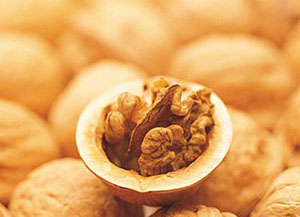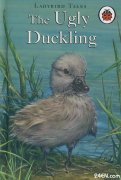仔细观察一个小孩,随便哪个小孩都行,你会发现,他每天都会发现一两件令他快乐的事情,尽管过一会儿他可能会哭哭啼啼。再看看一个大人,我们中间任何人都行。你会发现,一周复一周,一月又一月,他总是以无可奈何的心情迎接新的一天的到来,以温文尔雅、满不在乎的心情忍受这一天的消逝。确实,大多数人都跟罪人一样苦恼难受,尽管他们太百无聊赖,连罪恶都不犯--也许他们的冷漠就是他们的罪孽。真的, 他们难得一笑。如果他们偶尔笑了,我们会认不出他们的容貌,他们的脸会扭曲走样,不再是我们习以为常的固定不变的面具。即使在笑的时候,大人也不会像小孩儿那样,小孩儿用眼睛表示笑意,大人只用嘴唇。这实际上不是笑,只是咧列嘴;表示一种心情,但跟快乐无关。然而,人人都能发现,人到了一定地步(但又有谁能解释这是什么地步呢?),成了老人,他又会笑了。

R. Duncan
Observe a child; any one will do. You will see that not a day passes in which he does not find something or other to make him happy, though he may be in tears the next moment. Then look at a man; any one of us will do. You will notice that weeks and months can pass in which day is greeted with nothing more than resignation1, and endure with every polite indifference. Indeed, most men are as miserable as sinners, though they are too bored to sin-perhaps their sin is their indifference2. But it is true that they so seldom smile that when they do we do not recognize their face, so distorted is it from the fixed mask we take for granted3. And even then a man can not smile like a child, for a child smiles with his eyes, whereas a man smiles with his lips alone. It is not a smile; but a grin; something to do with humor4, but little to do with happiness. And then, as anyone can see, there is a point (but who can define that point?) when a man becomes an old man, and then he will smile again.
It would seem that happiness is something to do with simplicity, and that it is the ability to extract pleasure form the simplest things-such as a peach stone, for instance.
It is obvious that it is nothing to do with success. For Sir Henry Stewart was certainly successful. It is twenty years ago since he came down to our village from London , and bought a couple of old cottages, which he had knocked into one. He used his house a s weekend refuge5. He was a barrister. And the village followed his brilliant career with something almost amounting to paternal pride.
I remember some ten years ago when he was made a King's Counsel6, Amos and I, seeing him get off the London train, went to congratulate him. We grinned with pleasure; he merely looked as miserable as though he'd received a penal sentence. It was the same when he was knighted; he never smiled a bit, he didn't even bother to celebrate with a round of drinks at the "Blue Fox"7. He took his success as a child does his medicine. And not one of his achievements brought even a ghost of a smile to his tired eyes.
I asked him one day, soon after he'd retired to potter about his garden,8 what is was like to achieve all one's ambitions. He looked down at his roses and went on watering them. Then he said "The only value in achieving one's ambition is that you then realize that they are not worth achieving." Quickly he moved the conversation on to a more practical level, and within a moment we were back to a safe discussion on the weather. That was two years ago.
I recall this incident, for yesterday, I was passing his house, and had drawn up my cart just outside his garden wall. I had pulled in from the road for no other reason than to let a bus pass me. As I set there filling my pipe, I suddenly heard a shout of sheer joy come from the other side of the wall.
I peered over. There stood Sir Henry doing nothing less than a tribal war dance9 of sheer unashamed ecstasy. Even when he observed my bewildered face staring over the wall he did not seem put out10 or embarrassed, but shouted for me to climb over.
"Come and see, Jan. Look! I have done it at last! I have done it at last!"
There he was, holding a small box of earth in his had. I observed three tiny shoots out of it.
"And there were only three!" he said, his eyes laughing to heaven.
"Three what?" I asked.
"Peach stones", he replied. "I've always wanted to make peach stones grow, even since I was a child, when I used to take them home after a party, or as a man after a banquet. And I used to plant them, and then forgot where I planted them. But now at last I have done it, and, what's more, I had only three stones, and there you are, one, two, three shoots," he counted.
And Sir Henry ran off, calling for his wife to come and see his achievement-his achievement of simplicity.
【中文译文】:
三颗桃核
仔细观察一个小孩,随便哪个小孩都行,你会发现,他每天都会发现一两件令他快乐的事情,尽管过一会儿他可能会哭哭啼啼。再看看一个大人,我们中间任何人都行。你会发现,一周复一周,一月又一月,他总是以无可奈何的心情迎接新的一天的到来,以温文尔雅、满不在乎的心情忍受这一天的消逝。确实,大多数人都跟罪人一样苦恼难受,尽管他们太百无聊赖,连罪恶都不犯--也许他们的冷漠就是他们的罪孽。真的, 他们难得一笑。如果他们偶尔笑了,我们会认不出他们的容貌,他们的脸会扭曲走样,不再是我们习以为常的固定不变的面具。即使在笑的时候,大人也不会像小孩儿那样,小孩儿用眼睛表示笑意,大人只用嘴唇。这实际上不是笑,只是咧列嘴;表示一种心情,但跟快乐无关。然而,人人都能发现,人到了一定地步(但又有谁能解释这是什么地步呢?),成了老人,他又会笑了。
看起来,幸福同纯真的赤子之心有关系,幸福是一种能从最简单的事物里--譬如说,核桃--汲取快乐的能力。
幸福显然同成功毫不相干。因为亨利•斯图亚特爵士当然是个十分成功的人。20年前,他从伦敦来到我们的村子,买了好几座旧房屋,推倒后建了一所大房子。他把这所房子当作度周末的场所。他是位律师。我们村里的人带着一种几近父辈的骄傲心情追随他那辉煌的业绩。
我记得,大约十年前他被任命为王室法律顾问,阿莫斯和我看见他走下伦敦开来的火车便上前去表示祝贺。我们高兴的笑着;而他的表情却跟接到判刑通知书一样悲惨。他受封当爵士时也是如此,他没有一丝笑容,他甚至不屑于在蓝狐狸酒馆请我们大家喝杯酒。他对待成功就像小孩吃药一样,任何一项成就都未能使他疲惫的眼睛里露出一丝笑意。
他退休以后可以在花园里随便走走,干些轻松的闲活。有一天,我问他一个问题:一个人实现了一切雄心壮志是什么滋味?他低头看这玫瑰花,浇他的水。过了一会儿,他说:"实现雄心壮志的唯一价值是你发现他们都不值得追求。"他立刻改变话题讨论有实际意义的事情,我们很快谈论起万无一失的天气问题。这是两年前的事。
我想起这件事情,因为昨天我经过他的家,把我的大车停在他花园的院墙外边。我从大路把车赶到他花园外边是为了给一辆公共汽车让路。我坐在车上装烟斗时忽然听见院墙里面传来一声欣喜欲狂的欢呼。
我向墙内张望。里面是亨利爵士,他欢蹦乱跳像在跳部落出征的舞蹈,表现出毫无顾忌的真正的快乐。他发现了我在墙头张望的迷惑不解的面孔,他似乎毫不生气,也不感到窘迫,而是大声呼喊叫我爬过墙去。
"快来看,杰。看呀!我终于成功了!我终于成功了!"
他站在那里,手里拿着一小盒土。我发现土里有三颗小芽。
"就只有这三歌!"他眉开眼笑地说。
"三个什么东西?"我问。
"核桃。"他回答道,"我一直想种核桃,从小就想,当时我参加晚会后老是把核桃带回家,后来长大成人参加宴会后也这样。我以前常常种核桃,可是过后就忘了我种在什么地方。现在,我总算成功了。还有,我只有三个核桃。你瞧,一、二、三颗芽。"他数着说。
亨利爵士跑了起来,叫他的妻子来看他的成功之作--他的单纯纯朴的成功之作。







